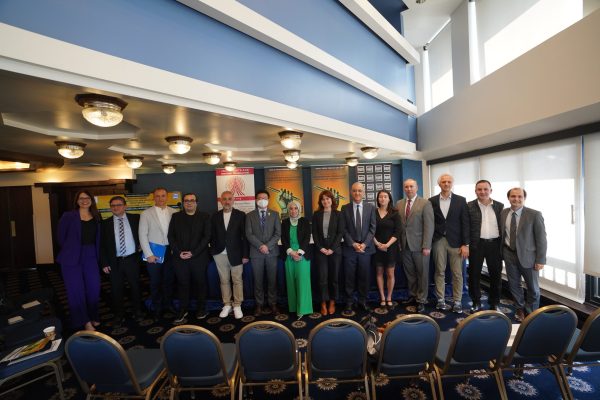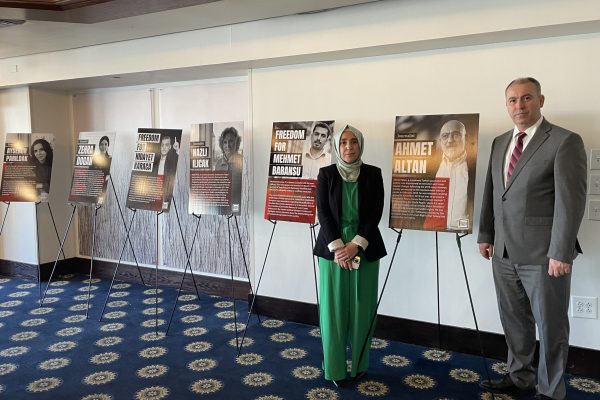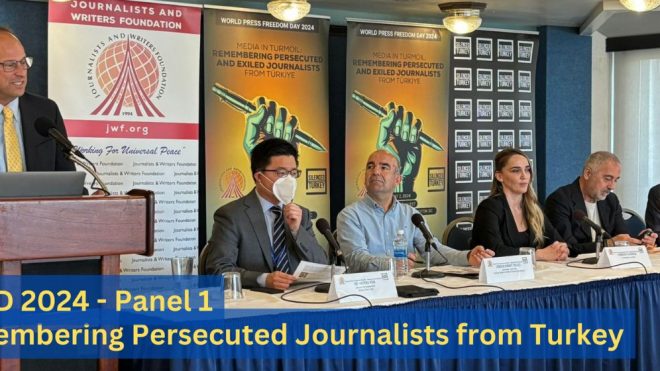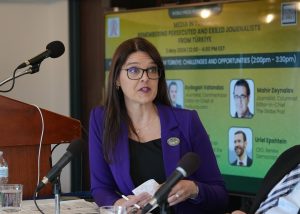World Press Freedom Day 20024
PANEL 2 - EXILED JOURNALISTS FROM TURKEY: CHALLENGES AND OPPORTUNIES
May 2, 2024 | 2:00pm – 3:30pm EST | National Press Club Washington D.C.
On May 2, 2024, from 12:00pm to 4:00pm EST, the Journalists and Writers Foundation, in collaboration with Advocates of Silenced Turkey, organized the World Press Freedom Day 2024 event on “Media in Turmoil: Remembering Persecuted and Exiled Journalists from Turkey” that took place at the National Press Club in Washington, D.C. In recognition of World Press Freedom Day, the event featured two panel discussions aimed at shining a light on the challenges faced by journalists and human rights defenders in Turkey and around the world. The discussions served as a platform for raising awareness and fostering dialogue on the trend of attacks on press freedom and freedom of expression.
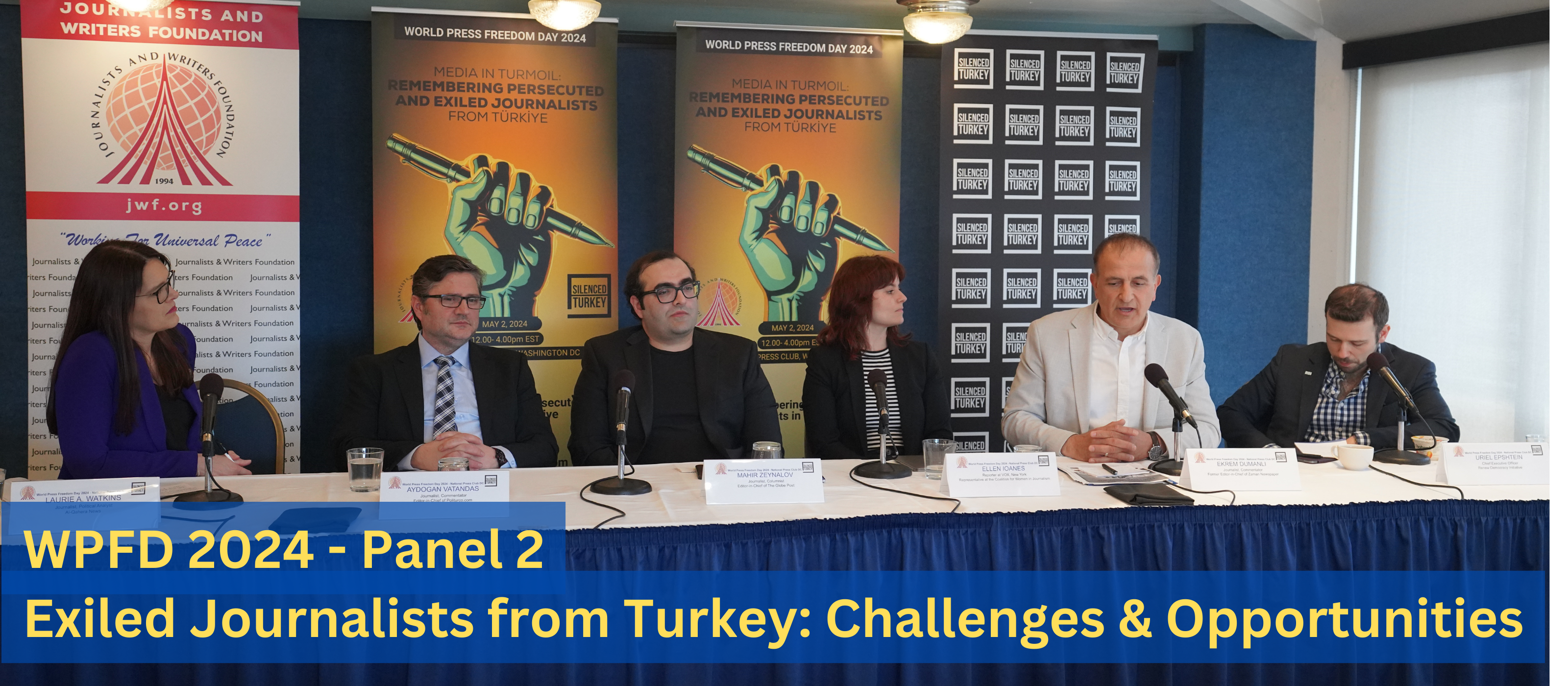
Panel 2 focused on the experiences of exiled journalists and human rights defenders from Turkey, who persisted in their work amidst threats of harassment, hate crimes, and transnational repression. Participants gained valuable insights into the strategies employed by governments to curb dissenting voices beyond their borders. The event served as a crucial platform for honoring courageous journalists who risk their lives to uphold democracy and transparency. Attendees came together to address the challenges confronting press freedom, reaffirming their commitment to the vital role of a free and independent press in society.
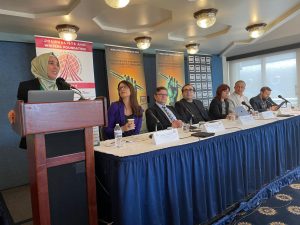 In her opening remarks, Hafza Girdap welcomed the distinguished guests and journalists to the event, co-hosted by Advocates of Silence Turkey and the Journalist and Writers Foundation. She talked about the lack of press freedom in Turkey, where journalists are targeted, detained, and even tortured for speaking out. She emphasized the importance of releasing jailed journalists so that the truth can be heard. Hafza Girdap introduced the moderator of the session, Laurie Watkins, who serves as a human rights and women’s rights advocate with a strong background in policy and politics.
In her opening remarks, Hafza Girdap welcomed the distinguished guests and journalists to the event, co-hosted by Advocates of Silence Turkey and the Journalist and Writers Foundation. She talked about the lack of press freedom in Turkey, where journalists are targeted, detained, and even tortured for speaking out. She emphasized the importance of releasing jailed journalists so that the truth can be heard. Hafza Girdap introduced the moderator of the session, Laurie Watkins, who serves as a human rights and women’s rights advocate with a strong background in policy and politics.
Laurie Watkins, moderator of Panel 2, introduced the journalists and experts who spoke at the event. Aydogan Vatandas discussed harassment and hate crimes against journalists in exile, Mahir Zeynalov talked about transnational repression against journalists in exile, Ekrem Dumanli addressed the suppression of media and press freedom in Turkey, Ellen Ioanes shared her expertise in women journalists in conflict zones with a focus on Turkey, and Uriel Einstein spoke about the role of press freedom in rebuilding democracy in Turkey. Watkins thanks them all for joining the event. Then, Laurie Watkins gave the floor to Uriel to comment on the statement that Turkey uses journalists to silence critics and exile, emphasizing the weaponization of the media by Erdogan to intimidate Turkish dissidents abroad, highlighting the impact on press freedom. Uriel Epshtein, CEO of Renew Democracy Intiative, mentioned that he has never faced arrest or physical threats for his work like some dissidents. He discussed the importance of amplifying the voices of dissidents within the Free World to combat oppressive regimes globally. Epshtein highlighted the weakening faith in democracies in the US and other free countries and emphasized the global conflict between freedom and tyranny. He talked about Erdogan’s use of press freedom language to threaten dissidents abroad and the need to recognize and combat the threats posed by authoritarian leaders collaborating with other countries. Epshtein stressed the importance of defending democracy worldwide as a collective responsibility against tyranny.
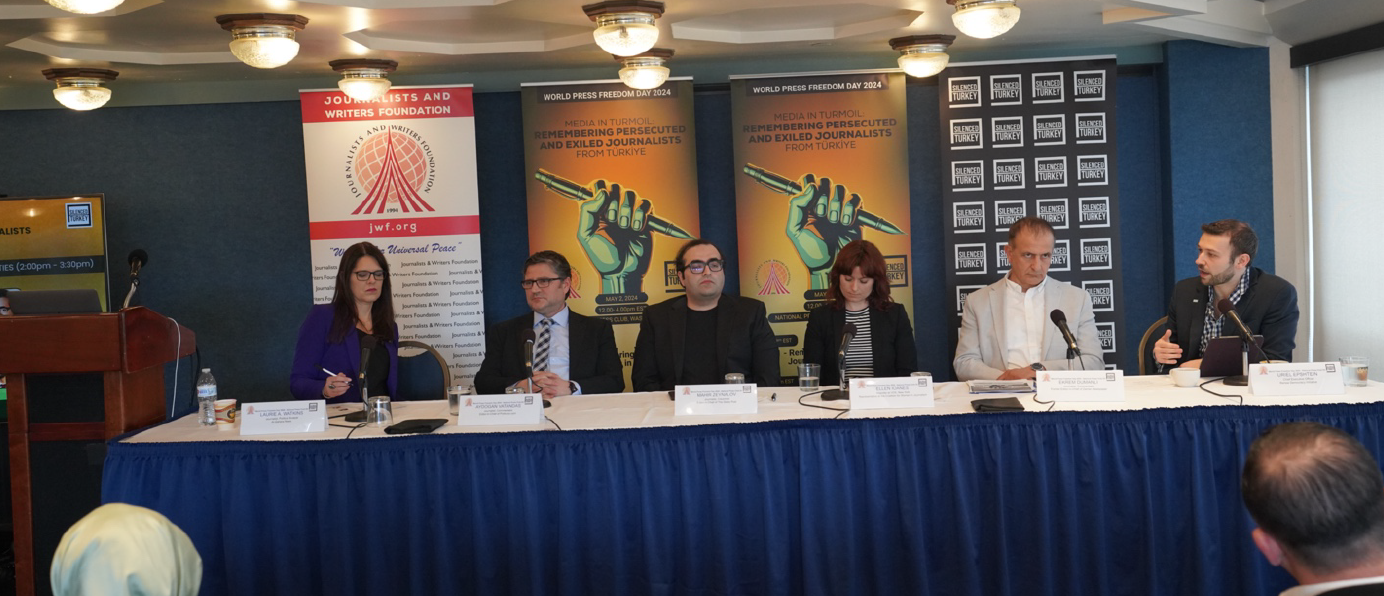
Aydogan Vatandas, Editor-in-Chief of Politurco.com, mentioned that Erdogan did not cooperate only with Russia, China or Iran but was also supported by the United States and the European Union because of the first Refugee crisis. Vatandas pointed out that Erdogan opened the door for Sweden and Finland for NATO membership and was a main oil provider for Israel, which often goes unnoticed. He noted that Western countries, including the United States, were helping Erdogan. Vatandas acknowledged the US State Department’s annual human rights reports highlighting issues with human rights violations in Turkey but emphasized that different interests could alter the perception. Vatandas highlighted Erdogan’s success in appeasing various global powers. Aydogan Vatandas emphasized the importance of impartiality and objectivity in addressing human rights violations. Vatandas stated that his coverage extends beyond issues faced by his associates to include marginalized groups such as Kurds and Socialists. Regarding international politics, he stressed the need to present a comprehensive view, citing articles on Erdogan’s trade agreements with Israel and his ties with Russia as examples of his approach to global affairs.
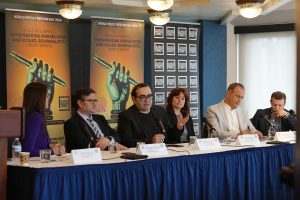 Mahir Zeynalov, Editor-in-Chief of The Globe Post, discussed the challenges faced by exiled Turkish journalists in securing funding and sponsorships in the United States compared to Europe. Zeynalov highlighted the lack of press freedom and democracy in Turkey and the limited support for Turkish media organizations in the US. In response, Zeynalov collaborated with friends to create niche media outlets that have garnered significant global reach and success. He emphasized the importance of building a strong media organization to promote democracy and civil liberties in Turkey.
Mahir Zeynalov, Editor-in-Chief of The Globe Post, discussed the challenges faced by exiled Turkish journalists in securing funding and sponsorships in the United States compared to Europe. Zeynalov highlighted the lack of press freedom and democracy in Turkey and the limited support for Turkish media organizations in the US. In response, Zeynalov collaborated with friends to create niche media outlets that have garnered significant global reach and success. He emphasized the importance of building a strong media organization to promote democracy and civil liberties in Turkey.
Ellen Ioanes, representative of the Coalition for Women in Journalism, talked about her organization that supports and advocates for women reporters and LGBTQ reporters globally. The Coalition documents press freedom violations, provides safety and mental health resources for journalists, and focuses on issues such as imprisonment and arrests. Ioanes emphasizes the importance of organizations like hers, as well as the Committee to Protect Journalists and Reporters Without Borders, in documenting violations of press freedom and advocating for journalists. She specifically mentions the targeting of Kurdish reporters in Turkey and the politically motivated charges against them. Ioanes believes it is crucial to speak truth to power and support colleagues in being able to do their jobs safely. She underscores the importance of journalism in upholding democracy and expresses gratitude for the opportunity to advocate for press freedom.
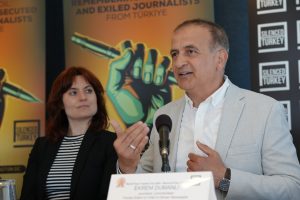 Ekrem Dumanli, former Editor-in-Chief of Zaman Newspaper, reflected on his past experiences with Recep Tayyip Erdogan, noting their interactions while he was studying in Boston and later in Korea. Dumanli highlighted his belief in democracy, pluralism, and journalistic integrity. He discussed a meeting with Abdullah Gul in Senegal where they talked about democratic reforms, only to later hear about Erdogan’s party facing closure. Dumanli expressed concerns about rising radicalism and urged Erdogan to defend democratic values. Despite his efforts, Dumanli was arrested in 2014 at Zaman’s headquarters, facing baseless accusations. He criticized Erdogan’s attempt to control the media and emphasized the importance of solidarity among journalists to defend press freedom and democratic values.
Ekrem Dumanli, former Editor-in-Chief of Zaman Newspaper, reflected on his past experiences with Recep Tayyip Erdogan, noting their interactions while he was studying in Boston and later in Korea. Dumanli highlighted his belief in democracy, pluralism, and journalistic integrity. He discussed a meeting with Abdullah Gul in Senegal where they talked about democratic reforms, only to later hear about Erdogan’s party facing closure. Dumanli expressed concerns about rising radicalism and urged Erdogan to defend democratic values. Despite his efforts, Dumanli was arrested in 2014 at Zaman’s headquarters, facing baseless accusations. He criticized Erdogan’s attempt to control the media and emphasized the importance of solidarity among journalists to defend press freedom and democratic values.
Uriel Epshtein emphasized the need for solidarity among journalists and individuals in the face of challenges in the modern world, where disinformation and demagoguery are prevalent. He highlighted the evolving role of journalists in not only reporting the truth but also actively advocating for liberal democracy and an open society. Epshtein discussed the importance of contextualization in presenting information to combat disinformation and demagoguery, acknowledging the difficulty in appealing to human psychology with simple narratives. He also mentioned his organization’s efforts in addressing transnational repression through hosting a conference and building an online media platform to unite dissidents globally and emphasize the interconnectedness of fighting authoritarianism across borders.
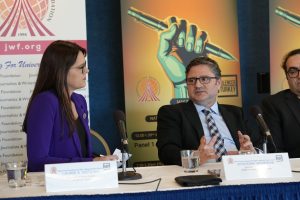 Aydogan Vatandas highlighted the global rise in authoritarianism and decline in democracy, emphasizing the relatively young age of democracy in the world’s history, originating around 300 years ago to protect assets from kings and intertwined with capitalism. He pointed out flaws in the United States, noting historic instances of rights violations, such as restrictions on African Americans and political activists, and recent examples like the arrest of a philosophy professor on a university campus. Vatandas criticized the double standards in the United States’ promotion of democracy while oppressing dissidents and activists at home, suggesting that respecting citizens’ rights is crucial before advocating for democracy and human rights worldwide.
Aydogan Vatandas highlighted the global rise in authoritarianism and decline in democracy, emphasizing the relatively young age of democracy in the world’s history, originating around 300 years ago to protect assets from kings and intertwined with capitalism. He pointed out flaws in the United States, noting historic instances of rights violations, such as restrictions on African Americans and political activists, and recent examples like the arrest of a philosophy professor on a university campus. Vatandas criticized the double standards in the United States’ promotion of democracy while oppressing dissidents and activists at home, suggesting that respecting citizens’ rights is crucial before advocating for democracy and human rights worldwide.
Uriel Epshtein discussed the distinction between imperfections in the American democratic system and the significant repression seen in authoritarian countries like Turkey, China, and Russia. He highlighted the progress and rights enjoyed by American citizens, journalists, and activists compared to those in authoritarian regimes. Epshtein also shared personal experiences of speaking out against injustices in Turkey and facing surveillance and fears for safety, emphasizing the importance of using one’s voice as an American citizen. He raised concerns about the increasing pressure on free expression and the imprisonment of journalists in Turkey, mentioning ways to circumvent barriers to press freedom, such as utilizing social media and finding alternative platforms to share the truth.
Aydogan Vatandas discussed the actions taken by the Erdogan government in Turkey, specifically mentioning the shutdown of the internet in the earthquake region. He questioned the motives behind such actions and speculated on whether political gains were sought through this move. Vatandas highlighted the consolidation of power by authoritarian leaders like Erdogan, emphasizing their reluctance to leave office through elections. He expressed concerns about Erdogan’s control over the military, intelligence, and police forces and suggested that he may resort to extreme measures, such as shutting down internet or social media platforms if faced with potential electoral losses.
Ellen Ioanes discussed the challenges faced by independent journalism in Turkey, where approximately 90% of the media is connected to the government. Despite government control of traditional media, the internet provides a platform for independent journalism to exist. Ioanes highlighted the targeting and harassment of individuals, particularly women, online and in person, as a way to intimidate and suppress information. She noted the presence of a protest culture in cities like Istanbul, where reporters are detained and charged under political charges for simply doing their job. Ioanes acknowledged the pushback against government actions but also highlighted the adaptability of the government and its supporters in shutting down protests and suppressing information.
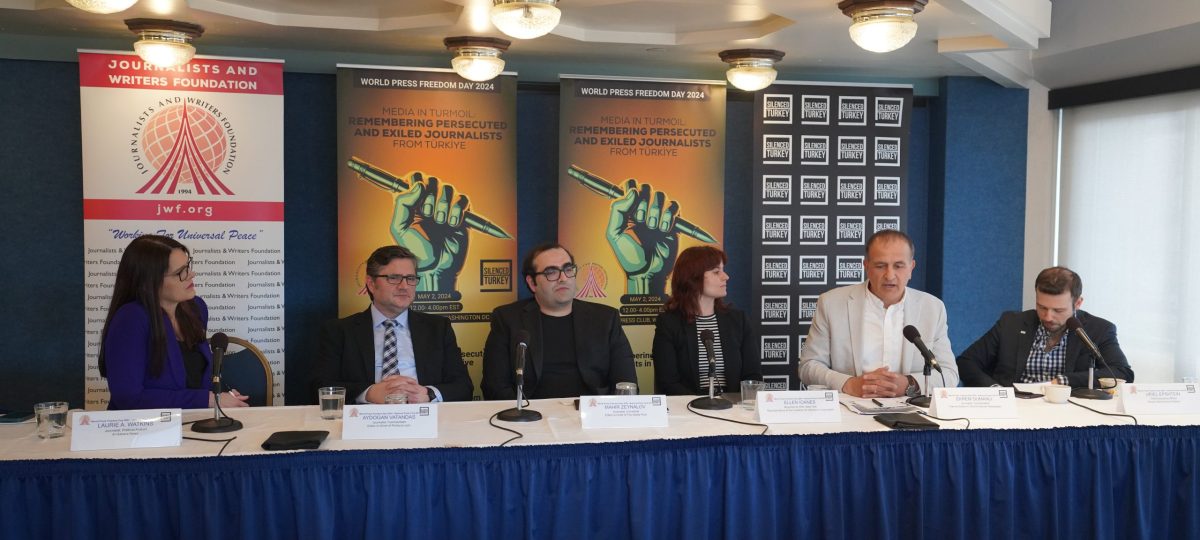
Ekrem Dumanli discussed the crackdown on media outlets and journalists by the Erdogan regime in Turkey, leading to the imprisonment of many writers and reporters. He compared Erdogan to Putin, stating that they both exhibit similar authoritarian tendencies. Ddumanli highlighted the lack of free media in Turkey and mentioned that Turkish people are turning to exiled journalists for information, such as Ergun Babahan, Adam Yavuz Arslan, and Abdulhamit Bilici. He noted the ease of access to information through social media platforms like YouTube, where journalists can share their work and reach a wider audience. Ddumanli emphasized that despite the risks journalists in Turkey face, many are utilizing social media as a platform to disseminate their work.
Laurie Watkins discussed audience questions regarding Erdogan’s government’s crackdown on media freedom in Turkey, co-opting journalists to work for government-friendly news outlets and becoming tools of repression. The question raised is whether this has allowed the state to extend its influence beyond Turkey’s borders.
Aydogan Vatandas shared his experiences of being demonized, dehumanized, and harassed by the Erdogan government after writing a book on Erdogan’s leadership style and an article about Erdogan’s son’s alleged involvement in smuggling ISIS oil. Vatadanas received death threats and reported the incidents to the FBI and law enforcement agencies. He expressed concerns about the Turkish government’s influence in New Jersey and mentioned the involvement of a police director who committed suicide in a restaurant affiliated with the Turkish government. Vatadanas highlighted the challenges he faced and questioned the circumstances surrounding the incidents he experienced.
Laurie Watkins highlighted the importance of discussing the role of gender in media and journalism, mentioning the anniversary of the death of Shireen Abu Akay, a Palestinian American journalist killed by an Israeli soldier. She emphasized the lack of justice in the case. Watkins directed the conversation towards the importance of women in journalism and the risks they face, particularly in Turkey. She asked for elaboration on the work of CSWIJ in Turkey regarding gender perspectives.
Ellen Ionaes discussed the importance of women in journalism and emphasized that women deserve the right to work in any job they choose. She highlighted the challenges women face in the industry, particularly in Turkey under Erdogan’s leadership, which has reinforced traditional gender roles and suppressed women’s voices. Ionaes shared her experiences covering war from a different perspective than male colleagues and addressed the specific threats and violations faced by women, including detention, rape threats, and online harassment. She highlighted the need for women to have a platform to share their experiences and advocate for their rights. Ionaes also discussed the support system provided by the Coalition for Women in Journalism and stressed the importance of solidarity and mutual support among female journalists. She emphasized the ongoing violations of press freedom in Turkey and the need for continued support and awareness of the challenges faced by women journalists in the industry.
Laurie Watkins discussed the significance of Mental Health Awareness Month in May and opened up a discussion on mental health and journalism. She mentioned the trauma and invisible wounds that journalists face while reporting on conflicts and the harsh realities they witness. Watkins asked about the impact of mental health on journalists and encouraged a conversation on how the field addresses mental health issues and provides support for those experiencing them.
Ellen Ioanes discussed the mental toll that journalists face, particularly in repressive environments where they are surveilled and threatened. She shared personal experiences of being surveilled by her own government while reporting in Guantanamo Bay, which had a significant impact on her mental health and ability to effectively do her job. Ioanes highlighted the challenges of self-censorship, questioning reality, and the psychological effects of constant surveillance on journalists’ well-being.
Mahir Zeynelov shared his personal experience of facing repression and threats as a journalist in Turkey, including being targeted by President Erdogan for speaking out against him. He discussed the manipulation of media and lack of press freedom in Turkey, highlighting the challenges journalists face in reporting on sensitive topics such as military coups, corruption, and the Kurdish issue. Zeynenlov also addressed the issue of gender representation in leadership roles in the media industry, noting the lack of women in top positions in both Turkey and the United States. He emphasized the importance of addressing this lack of diversity and solidarity within the journalism field as a means of combating authoritarian manipulation of the media.
Laurie Watkins expressed gratitude to the participants for their engagement in the panel discussion and emphasized the importance of ending on a positive note. She asked each panelist to share something they are hopeful about regarding the current state of journalism.
Aydogan Vatandas discussed the importance of creating a new global narrative that prioritizes humanity over national interests. He emphasized the need for countries to come together, strengthen the United Nations, and engage in dialogue to reach a consensus. Vatandas highlighted the idea that ultimately, we are all human beings and share a common humanity, and suggested that only when this is recognized can discussions about free journalism and human rights truly progress.
Mahir Zeynalov expressed hope in the potential for democracy and a vibrant media in Turkey, highlighting the country’s history of democratic values. He contrasted Turkey with countries like Iran, Egypt, and Russia, noting that there is still a memory of a time when journalists could speak truth to power in Turkey, providing a glimmer of hope for the future.
Ellen Ionaes finds it challenging to remain optimistic about the state of journalism, particularly in the United States, but draws hope from organizations like the Coalition that support journalists. She emphasizes the importance of recognizing the critical role of journalists, advocating for their rights, and addressing the threats and challenges they face in their work. Despite the difficulties, being part of such organizations gives her hope for the future of journalism.
Ekrem Dumanli shares personal stories of his family members and relatives being persecuted and imprisoned due to their connection to journalism. Despite the hardships his family has faced, he believes in the eventual end of such oppressive practices and hopes for a future where the injustices of the present will be acknowledged and rectified. Drawing parallels with past mistakes in Turkey, he expresses confidence that one day the current regime will be gone, and people will come to understand and regret the suffering inflicted on journalists and others. Dumanli remains hopeful for a future where freedom of speech and journalism are upheld and defended.
Uriel Epshtein finds hope in the example of Poland, where an authoritarian government was defeated in an election, leading to attempts to repair the damage caused by their rule. He believes this serves as a model for countries experiencing backsliding towards authoritarianism, showing that it is possible to recover and prevent further regression. Additionally, he sees a growing awareness among democracies in the world of the threat posed by authoritarian regimes and envisions the possibility of a league of democracies in the future. This alliance would facilitate collaboration and prevent authoritarian regimes from hindering the cooperation of free nations. Uriel anticipates a shift towards greater collaboration among liberal societies as awareness of these global challenges increases.
Laurie Watkin thanks the audience for attending and staying for the session, expressing gratitude to the panelists for their time and expertise as she believes their contributions enriched the discussion.
Mehmet Kilic echoes her sentiments and expresses appreciation for the moderator and speakers, acknowledging the support of Mehmet Saracoglu in making the event possible. He then invites Ibrahim Anli to deliver the closing remarks, recognizing his role as the Executive Director of the Rumi Forum in Washington DC.
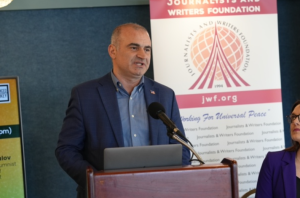 Ibrahim Anli expresses gratitude to the Journalists and Writers Foundation and the Advocates of Silenced Turkey for organizing the event, praises the panelists for their insightful remarks, highlights the global challenges to freedom of the press, emphasizes the need for leaders to take these issues seriously, and calls for collaborative and impactful action moving forward. He encourages further study of the points discussed and urges everyone to consider what more can be done.
Ibrahim Anli expresses gratitude to the Journalists and Writers Foundation and the Advocates of Silenced Turkey for organizing the event, praises the panelists for their insightful remarks, highlights the global challenges to freedom of the press, emphasizes the need for leaders to take these issues seriously, and calls for collaborative and impactful action moving forward. He encourages further study of the points discussed and urges everyone to consider what more can be done.
